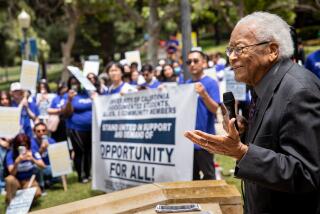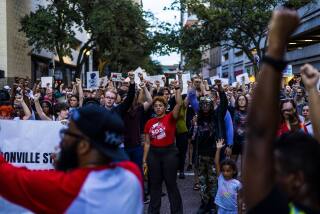A Jump Off a Bridge Won’t Kill This Monster : Racism: It is now so powerful in our domestic and foreign policy that it threatens the soul of our nation and our status as leader of the Free World.
- Share via
Police now believe that a cold-blooded murderer in Boston plotted to kill his pregnant wife, then produced an instant alibi by blaming his crime on an African American man. Charles Stuart knew that pulling the race cord would ring the bells of fear in a nation still tasting the lingering poison of a presidential campaign that played on racial anxiety. The police looked into Stuart’s role in his wife’s death only when his brother told them what he knew. Then Charles Stuart, who understood how racism worked in America, jumped off a bridge.
This monstrous episode has much to teach us about the dynamics of racism in our country. The brutal ideology that was set back by the Civil War, Reconstruction and the civil rights movement has returned with tremendous force during the past decade. Racism is now so powerful again in our domestic and foreign policy that it threatens the soul of our nation and our status as leader of the Free World.
Candidate Ronald Reagan sent the first deafening race-signal in 1980 with his transparent appeal to states rights in Philadelphia, Miss., where Michael Schwerner, James Cheney and Andrew Goodman, two Jews and one African American, were killed by white supremacists in 1964.
And so the racial agenda for the Reagan-Bush years was set: the diluting of the Civil Rights Commission; the laying of a wreath in a German cemetery where some Nazi soldiers were buried; the attack on affirmative action; President Reagan’s suggestion in 1983 that Dr. Martin Luther King Jr. was a communist; the retrenchment on civil rights and social justice; the Bush campaign committee that included members known for past anti-Semitic activities; and the shameful presidential campaign in 1988 that featured furloughed prisoner Willie Horton. As many have noted, Reagan took the shame and guilt out of racism.
In foreign policy, too, racism made a comeback. The “constructive engagement” with the apartheid government in South Africa became the symbol of the Reagan-Bush approach to the human rights of nonwhite people. The arming of rampaging guerrillas in Angola and Nicaragua showed a shocking indifference to life in the Third World, as did the military invasions of Grenada and Panama. Would we be so quick to invade these nations and so cavalier about the death of their people if those dying were, say, Europeans?
Even the good news of walls tumbling down in Eastern Europe contains a dark lining for the people of Africa. For, as the Congress hurried to approve millions more for Eastern Europe, African experts noted the total U.S. aid to the countries of sub-Saharan Africa was likely to fall as a result.
Closer to home, it was shocking to watch the misplaced priorities over the last few weeks as letter-bombs exploded in the hands of judges and NAACP leaders across the South while President Bush placed a bounty on the head of Manuel A. Noriega. Where are the bounties on the heads of the white supremacists terrorizing citizens and public officials in America?
The racism that still contaminates public policy must be overcome. The war on drugs, for example, will go nowhere as long as we accept the myth that the average drug user is an African American male. The reality, according to the National Parents’ Resource Institute for Drug Education, is that the average drug user is a white male, and drug problems are “significantly worse” among white youth than African American youth. The least likely drug user is an African American female.
And yet the police arrest African Americans at a rate far higher than they arrest whites. While African Americans constitute only 12 percent of those who abuse drugs, according to the National Institute on Drug Abuse, they make up 38 percent of drug arrests. This means that African Americans constitute a small minority of drug users but a vastly disproportionate percentage of prisoners taken in the war on drugs. That is not right.
Meanwhile, the African American middle class is shrinking, hanging on the precipice. While college-educated white men earn an average $35,701 a year, African American male college graduates earn an average of $26,550. As Money magazine concluded in a study of the eroding African American middle class, “As long as today’s pattern of discrimination continues, blacks will never become fully integrated into the American economic mainstream--and both races will continue to pay the high price for living in different worlds.”
So we have much work ahead of us to take down our own wall--the wall of racism and hatred. As the cynical Charles Stuart showed us before his leap from the bridge, it is far too easy in America to blame African Americans.
As we celebrate the birthday of Dr. Martin Luther King Jr., we must remember that the wall of racism keeps all Americans apart, incomplete and down. Racism is good neither for the racist nor the victim. It is personally destructive, politically divisive, economically exploitative, and theologically a sin. Racism is contempt for God because it assumes that God made an error in creating a world of difference.
As Dr. Martin Luther King said, “All life is interrelated. All humanity is involved in but a single process, and to the degree I harm my brother, to that extent I harm myself.”
More to Read
Get the L.A. Times Politics newsletter
Deeply reported insights into legislation, politics and policy from Sacramento, Washington and beyond. In your inbox twice per week.
You may occasionally receive promotional content from the Los Angeles Times.








